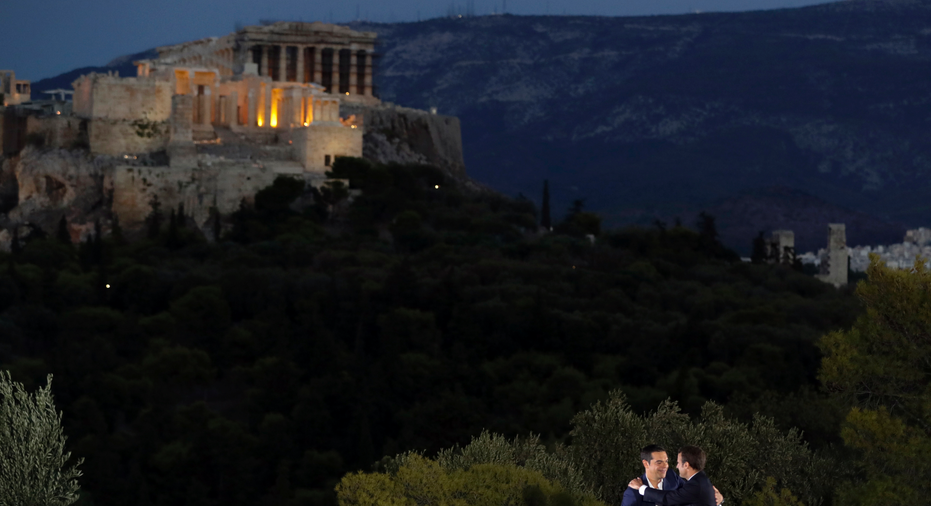At democracy's birthplace, France's Macron dreams of EU 2.0

ATHENS, Greece – Standing at a Greek site where democracy was conceived, French President Emmanuel Macron called on members of the European Union to reboot the 60-year-old bloc with sweeping political reforms or risk a "slow disintegration."
Macron, on a visit Thursday to Athens, urged EU nations to carry out six-month national reviews on EU reforms before imposing them — signaling his distance with the German-backed approach based on fiscal discipline within the eurozone.
"It would be a mistake to abandon the European ideal," Macron said. "We must rediscover the enthusiasm that the union was founded upon and change, not with technocrats and not with bureaucracy."
Elected by a landslide in May, the 39-year-old Macron has vowed to back efforts for closer integration in the EU, which has been rattled by a financial crisis, migration issues, a populist backlash and Britain's decision to leave.
His proposal found enthusiastic support in bailout-stricken Greece, which considers France a vital ally and counterweight to fiscally hawkish Germany in its efforts to ease the stringent terms of its international rescue loans.
Reinforcing his message, Macron urged the International Monetary Fund to step back from its role in European bailouts — breaking with a widely accepted policy adopted when Greece sought international help seven years ago.
"I don't think it was the right method for the IMF to supervise European programs and intervene in the way it did," he said. "Let's work within Europe and not turn to outside agencies."
The eurozone rescue fund, the European Stability Mechanism, should play the lead role in financial rescue within the euro currency zone, he said.
France, Europe's No. 2 economy, had previously backed Germany's insistence in involving the IMF to enforce austerity measures that came with bailout programs in Greece and other rescued economies including Ireland, Portugal and Cyprus.
Athens has relied on international rescue loans since 2010, and in return has seen its economy put under strict supervision by its creditors. Successive governments have had to enforce radical fiscal and structural reforms, including pension cuts and repeated tax hikes, in order to qualify for the loans.
Thursday's visit came hours after Hurricane Irma, the strongest Atlantic Ocean hurricane on record, battered French, British and Dutch territories in the Caribbean.
"All of France is grief-stricken by the many victims yesterday from the hurricane," Macron said. He promised to visit the region when the weather lets up and put climate change "at the heart" of policymaking.
His evening speech was given in front of the ancient Acropolis on Pnyx Hill, where popular assemblies were held in Athens 2,500 years ago and the idea of democracy was developed.
The French president delivered his opening remarks in Greek, delighting an audience that included most of the Greek Cabinet.
Elsewhere in the city, heated arguments broke out between police and stranded motorists as roads were closed across the capital for hours. More than 2,000 police officers were on duty for the visit.
A small group of left-wing demonstrators defied a 17-hour protest ban and forced their way through a cordon, briefly clashing with police.
___
Follow Gatopoulos at http://www.twitter.com/dgatopoulos and Becatoros at http://www.twitter.com/ElenaBec
___
Sylvie Corbet in Paris and Nicholas Paphitis in Athens contributed to this report.



















